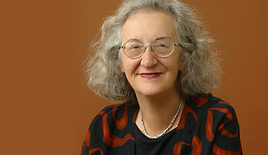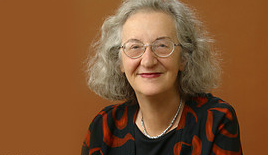The voice of J.S. Bach is ever-present in Western music, a point made emphatically by the Carmel Bach Festival’s varied opening program Saturday at Carmel’s Sunset Center. Along with the unveiling of a new work based on one of Bach’s favorite compositional devices, his influence was heard in a late 19th-century choral masterwork, and Festival Director and Conductor Paul Goodwin and the festival’s artists brought forward a dramatic reading of a great and little-heard cantata by Bach himself.

Photo by Christian Steiner
The continuing potential of Bach’s legacy to inspire new music was vividly displayed in the premiere of Scottish composer Thea Musgrave’s LARGO in homage to B.A.C.H., for string orchestra, this year’s festival commission. Although Musgrave is identified as one of the leading composers of her generation to emerge from the U.K., she has spent much of her life in California, and was an apt choice for the commissioning role. Following Bach’s practice of using the melodic motive spelled by the German musical letters B-A-C-H (Bb-A-C-B in English), Musgrave instead uses the four pitches as a chord. Sounding together, the pitches have a moody, unsettled quality that defined the tone of the piece.
Musgrave has devoted a substantial amount of her writing to concerto forms, and the LARGO is a kind of miniconcerto, with the solo role moving from bass to cello to viola to violin over the course of this short work. The musical roles were dynamic and fluid, as a given soloist would remain interwoven with the next one before the new solo voice asserted itself at the center of the music. At the same time, surging lines in both the solo parts and the string sections created a continuous exchange of foreground and background roles. Traditional harmonies occasionally appeared as musical signposts, before the work ended, movingly, with a quote from the chorale “O Haupt voll Blut und Wunden,” from Bach’s St. Matthew Passion.
The continuing potential of Bach’s legacy to inspire new music was vividly displayed in the premiere of Scottish composer Thea Musgrave’s LARGO in homage to B.A.C.H.
The only real flaw in the piece is its brevity. The solo lines, especially, are full of gritty, exciting material and rhythmic force, and the command Musgrave displayed in varying the hues and tension of the orchestral material proved that the work could have gone on quite longer. I’d guess the piece was written to a prechosen length, and Musgrave’s formidable abilities led to a satisfying piece, but I was left wanting more.
O, Bach
Bach himself was represented by the cantata O Ewigkeit, du Donnerwort, BWV 20, which opened the program. Goodwin led a sharp performance of the work, which has a rather fire-and-brimstone text and music of great intensity. A striking aspect of the performance, and one that continued all evening, was the vocal quality of the orchestral playing, with instrumental phrasing as vivid and full of breath as the singing. The players and chorus also provided a rich setting for a strong trio of soloists — tenor Thomas Cooley, baritone Peter Harvey, and countertenor Daniel Taylor. Some memorable moments came in Cooley’s and Taylor’s riveting duet in the penultimate movement, “Menscheinkind, hör auf geschwind,” and in Taylor’s poignant recitative with solo trumpet.
The solo lines, especially, are full of gritty, exciting material and rhythmic force.
Along with the Bach rarity, there was a little-known piece by Handel, his Concerto No. 2 a Due Cori in F Major, HWV 333. The piece is built around exchanges between two solo groups, each consisting of two oboes, two horns, and a bassoon. Goodwin described this as a choral work for instruments, and both Handel’s choral works and operas came to mind at times, with lyrical writing for the solo winds and gorgeous playing by the oboes in particular. In six short movements, this work covers a broad emotional gamut, full of the grace and humanity of Handel’s larger works.
The concert concluded with a very fine performance of Fauré’s Requiem. This was a showcase for the festival chorus, which sang with a tender, organlike purity as well as a mastery of the work’s shifting expressive modes. Goodwin brought about a unity of choral and instrumental phrasing, and expertly shaped the work’s expressive arc. Peter Harvey returned to the stage with an excellent performance that got to the heart of the music, while soprano Dominique Labelle offered affecting singing that captured the pleading quality of the “Pie Jesu” movement.
The program’s only disappointments came in some aspects of the presentation. In lieu of printed texts, supertitles were projected above the stage. Fair enough, but they were a bit washed out by the stage lights. And audience members who weren’t willing to spring for the festival’s $10 program were provided with a single sheet, which didn’t name the instrumental soloists, let alone the full roster of players or the chorus members. These outstanding performers deserve better, and, Goodwin’s energetic stage remarks notwithstanding, a little more background, especially on the lesser-known works, would have been of benefit to the audience.

